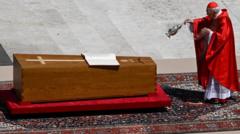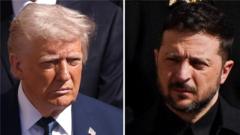The death of Pope Francis has initiated a complex transition period governed by ancient traditions and ceremonial language. Essential terms such as "Conclave" and "College of Cardinals" play a crucial role in the election of the next pope, highlighting the organized yet secretive nature of this historic process.
Understanding the Papal Transition After Pope Francis' Passing

Understanding the Papal Transition After Pope Francis' Passing
As the world mourns the passing of Pope Francis, the Catholic Church prepares for the intricate process of selecting his successor.
The death of Pope Francis on April 26, 2025, marks the beginning of an intricate transition period within the Catholic Church, characterized by centuries-old customs and specialized terminology. As the Church prepares for the election of a new pope, it is essential to understand the key concepts that define this process.
One of the foremost terms is "Conclave," which refers to the assembly of cardinals tasked with electing the next pope. The term, derived from Latin meaning "with key," reflects the isolation imposed on the cardinals during their deliberations. Within the Conclave, which is set to commence in the coming month, cardinals vote in private until a two-thirds majority is achieved, ultimately leading to the selection of a new leader for the Church's global congregation of more than one billion adherents.
Another important group involved is the "College of Cardinals," consisting of 252 cardinals who serve as advisors and assistants to the pope. This elite assembly plays a critical role in selecting the pope's successor following the pontiff’s demise. Historically known as the "princes of the Church," cardinals have their title rooted in the Latin term "cardinalis," meaning "serving as a hinge." The current dean of the College, Giovanni Battista Re, oversees pre-conclave activities but will not participate in the voting due to age restrictions, as only cardinals under 80 are eligible to cast votes.
As the Catholic Church navigates through this poignant time, the transition processes and the terminology surrounding them remain vital to understanding the complexities of papal succession. The following weeks promise to be significant for the Church and its followers as they await the next chapter in the Vatican's history.






















